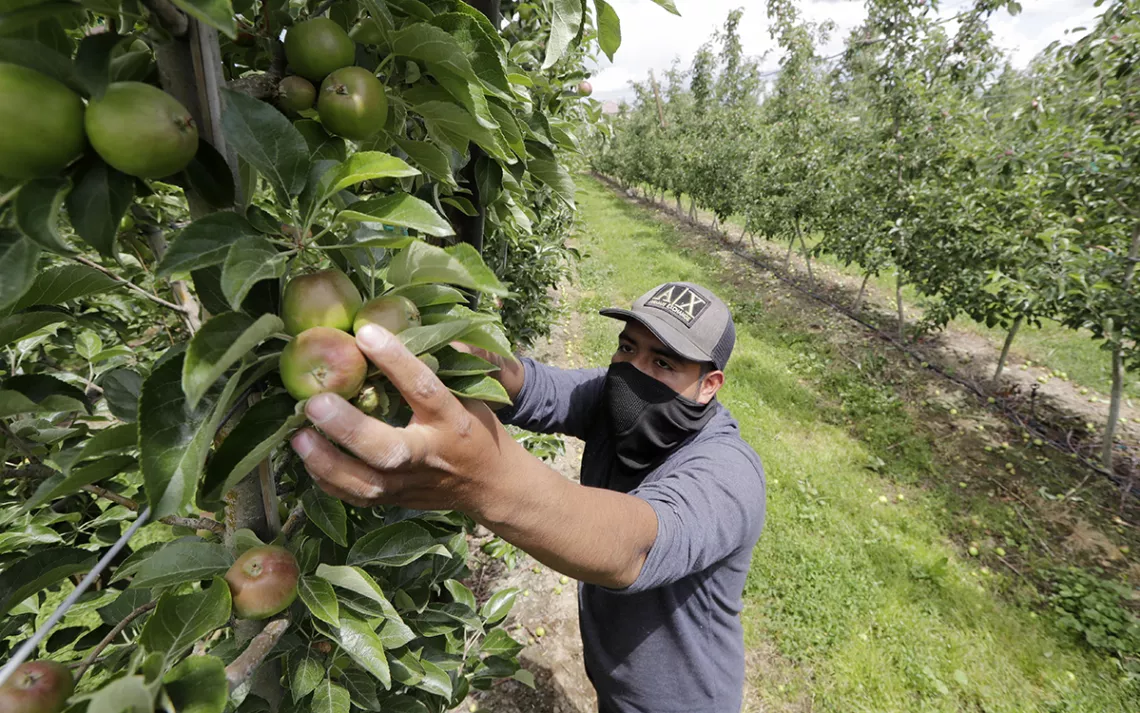My Father and the Heat Dome
Climate change is amplifying injustice for farmworkers

An orchard worker in Yakima, Washington, in 2020. | Photo by Elaine Thompson | AP
In Omak, the farm town where I grew up in Eastern Washington, the summers are always hot—often in the 90s, occasionally 100°F. In the first week of July, a heat dome descends on the West Coast, driving temperatures to record-breaking levels. When my mom calls, I ask her if my dad still has to go to work in the fields. She says they are making him go in at 6 A.M. so that he can stop working at noon instead of the usual 2 P.M. and "avoid the heat as much as possible.” The temperature tomorrow is going to be 117°.
I feel like I should have known better than to think farmworkers would be able to avoid working in a record heat wave. My parents are expected to work through all conditions: rain, snow, fires. They worked all through the pandemic. Unemployment is not an option for them—many farmworkers, including my parents, do not qualify for any government help because of their immigration status.
My father came to the United States in the 1970s on an H2 visa. He first arrived in California but fell in love with Washington State. A Nahua native, he loved the opportunities for hiking, fishing, and hunting. He stayed, working in the fields. My mom, like many other women of farmworker families, got a job in the warehouses packing fruit. Working in the warehouses presents its own sets of challenges—during the summer, the nearest big seasonal warehouse is in Brewster, a big cherry-producing town 45 minutes away. Seven days a week, she drives an hour and a half round-trip to work, in weather so hot that the air-conditioning in her car stops working.
I work on the other side of the Cascades, to the west, at a local nonprofit called Vamos Outdoors that helps Latinx youths and other kids who are English language learners. During the summer, Vamos runs summer school programs for the children of migrant farmworkers that include both indoor classes in math and the arts and outdoor classes in hiking and mountain biking.
The summer school program is supposed to start this week, but on the first day of the heat wave, I find out that the start has been delayed because of the hot weather. By the time I find out, my dad is in the fields already. His employer has provided water but no shade. He tells me that by 9 A.M., temperatures are so hot that everyone gets sent home.
I’m relieved that he isn’t out there, in danger, but I also know that having his hours cut in half during a heat wave will greatly affect my parents and other families. Many families that work in the fields are already struggling because of the pandemic and their already low wages.
That week, United Farm Workers asks Jay Inslee, the governor of Washington, to issue emergency standards that would grant farmworkers in heat waves the same rights that military personnel have: drinkable water, shade, breaks that don’t cut into wages, and medical assistance in case workers go into heat shock. The governor did not grant their request. My brother serves in the national guard, but unlike my brother, my dad goes unrecognized and unrewarded for his service, work, and sacrifice.
In other parts of Eastern Washington, farmworkers are told to work during the night, using headlamps to avoid working in the heat. This is almost as unsafe as working in the heat, since orchard work involves ladders—not so easy to navigate quickly in the dark, even with a headlamp. No one, my parents included, receives any increase in wages or hazard pay for having their working conditions worsen.
In the past few years, wildfires have hit Washington State hard. No matter how close the fires are to the orchards, my parents continue to go to work. In the past three years, I've been able to avoid the fires by avoiding the eastern side of the state, but it’s frightening when I see how close the fires are to my parents' work. One year the fires came so close to our house we had to leave for several days.
My dad tells me that when he first came to work in the orchards over 20 years ago, there were no wildfires the way there are now. It didn’t used to get this hot. The winters were colder and snowier. He’s seen the environment changing more clearly than most, because every change affects his working conditions, hours, and wages.
All week, I am scared to call or text my parents out of fear of the very real possibility that my dad has passed away from working in the heat. I later find out that at least one agricultural worker died in the heat wave—Sebastian Francisco Perez, a 38-year-old from Guatemala, working at a nursery in Oregon, a state that is developing rules to protect people working in extreme heat and wildfire smoke but still hasn’t adopted them.
But I am lucky. Every day that week, my dad comes home from work. When he returns, he does what he always does: immediately takes a shower to wash off the pesticides from the orchards, changes into a new set of clothes, and has a few hours of leisure time before waking up the next morning to go back into the fields and do it all again.
 The Magazine of The Sierra Club
The Magazine of The Sierra Club



